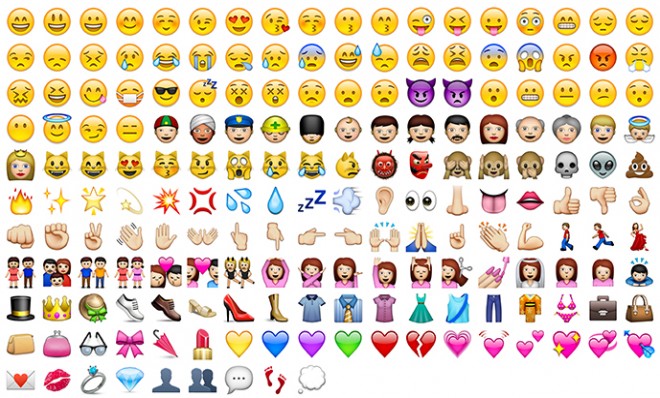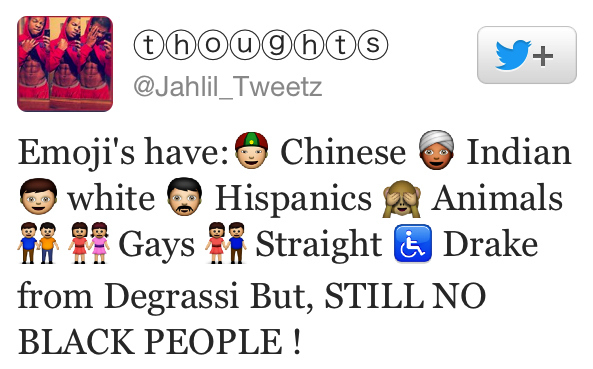It's time for Emojis to be more diverse
"If these Emoji are going to be the texting and Twitter standard, we think it'd be cool if they better reflected the diversity of the people using them"

A free daily email with the biggest news stories of the day – and the best features from TheWeek.com
You are now subscribed
Your newsletter sign-up was successful
Emojis have now fully embedded themselves into our digital vocabulary, showing up in everything from forgettable Katy Perry videos to comedians tapping rap lyrics into their iPhones. The sentiment behind Emojis is nothing new, of course. It's why we started pairing colons with closed parentheses and cocking our heads to the side in the first place.
Now, should you find yourself in a situation in which words do not suffice, the iOS keyboard offers hundreds of Emoji options for you to pick from. There are several pixelated yellow faces representing the full spectrum of boredom, for instance. There are at least 10 variations for hearts. There are Emojis of gay couples holding hands, a smiling turd, demon masks, and a beaming cherub. There are white faces — both young and old — as well as tokenistic caricatures of what appear to be an Asian boy, an Indian man, and a family of Latinos.
What there aren't, however, are any Emojis for black people. Not a single one.
The Week
Escape your echo chamber. Get the facts behind the news, plus analysis from multiple perspectives.

Sign up for The Week's Free Newsletters
From our morning news briefing to a weekly Good News Newsletter, get the best of The Week delivered directly to your inbox.
From our morning news briefing to a weekly Good News Newsletter, get the best of The Week delivered directly to your inbox.
It's an egregious omission, and one that's drawing the ire of a petition circulating on DoSomething.org, as Fast Company initially reported. The petition is calling for Apple to update its iOS keyboard to more accurately reflect the multitude of people who use it. It states:
…of the more than 800 Emojis, the only two resembling people of color are a guy who looks vaguely Asian and another in a turban. There's a white boy, girl, man, woman, elderly man, elderly woman, blonde boy, blonde girl and, we're pretty sure, Princess Peach. But when it comes to faces outside of yellow smileys, there's a staggering lack of minority representation. [DoSomething.org]
The conspicuous absence of black faces on the Emoji keyboard is both "deeply troubling and probably racist," says Andy Holdeman at PolicyMic. The "easy answer" is that Emojis were developed in Japan, where there aren't very many black people. But that's a cop out, argues Holdeman, considering there are also two different icons for camels. Yep. Camels.
Emoji was originally developed by Shigetaka Kurita, who engineered the expressive reaction faces many years ago, around the time Windows 95 first began taking off in Japan. In 2010, they were added to the Unicode Standard in other countries, including the United States.
Calls for a more diverse Emoji palette have been building in volume for a few months now. Even Miley Cyrus — whose recent indiscretions appropriating ratchet culture haven't exactly endeared her to the black community — rallied behind the cause back in December.
A free daily email with the biggest news stories of the day – and the best features from TheWeek.com
Support for better icon representation has been building steadily. Back in February during Black History month, users took to Twitter, Instagram, and other digital formats to call for more Emoji diversity.

(via BuzzFeed)
A lack of representation in something as inconsequential as dumb faces we text to each other is a firm reminder that racism isn't always explicit; more often, racism rears its head by marginalizing cultural influence in small, stubbornly ugly ways. "If these Emoji are going to be the texting and Twitter standard," write the petition's authors, "we think it'd be cool if they better reflected the diversity of the people using them."
You can sign it over at DoSomething.org.